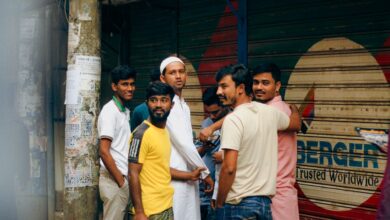The End of a 28-Year Odyssey: Scotland’s Triumph

There are moments in sport that etch themselves into the collective memory of a nation. For Scotland, the evening at Hampden Park, where the Tartan Army secured automatic qualification to next year’s World Cup finals, was precisely one of those. The roar, the relief, the raw emotion — it was a culmination of nearly three decades of hope, heartbreak, and unwavering support. Fans danced in the stands, players embraced on the pitch, and a generation finally saw their country return to football’s biggest stage.
Amidst the joyous pandemonium, as the Scottish captain, Andy Robertson, soaked in the adulation, his mind drifted. Not to tactics, not to past defeats, but to a friend, a teammate from a different club, and a player from a rival nation: Diogo Jota. Robertson’s candid admission, “He’ll be smiling over me,” offered a poignant, unexpected glimpse into the complex, often unseen bonds that tie professional footballers together, transcending the fierce rivalries of club and country.
The End of a 28-Year Odyssey: Scotland’s Triumph
To truly understand the weight of Robertson’s sentiment, one must first grasp the magnitude of Scotland’s achievement. For 28 long years, the nation had yearned for a return to the World Cup. It had become a generational quest, a recurring narrative of ‘almost there’ that often ended in disappointment. Grandparents had seen their heroes compete, but their children and grandchildren had only heard the tales.
The night at Hampden Park wasn’t just a football match; it was an emotional reckoning. The atmosphere was electric, a cauldron of expectation and anxiety. Every tackle, every pass, every save was met with a symphony of hope and fear from the stands. When the final whistle blew, signalling the end of the wait, it wasn’t just a victory for a football team, but a catharsis for an entire country. The joy was palpable, a release of pent-up emotion spanning nearly three decades.
For players like Robertson, who have carried the hopes of a nation on their shoulders for years, the moment was deeply personal. This wasn’t just another game; it was history. It was legacy. And yet, even in this moment of unparalleled national pride, his thoughts turned to someone else’s footballing journey.
Club Camaraderie vs. National Rivalry: A Modern Footballing Paradox
Robertson’s comment about Diogo Jota wasn’t just a throwaway line; it was a profound insight into the modern footballer’s world. Jota, a prolific forward for Portugal and Robertson’s teammate at Liverpool, was unable to participate in his own country’s play-off due to injury. The irony isn’t lost: while Scotland celebrated their qualification, Portugal faced the uncertainty of the play-offs without a key player.
This situation perfectly encapsulates the unique paradox of modern football. Players spend the majority of their time together at club level, forging deep bonds, sharing locker rooms, celebrating victories, and commiserating over defeats. They become surrogate families, traveling the world, living under intense scrutiny, and sharing a common goal week in, week out. These relationships are often far more consistent and intimate than those experienced in the sporadic international breaks.
The Unseen Bonds of the Dressing Room
When Robertson spoke of Jota smiling, it wasn’t a patronizing thought; it was an acknowledgment of a shared humanity and a genuine friendship. Despite the fact that their national teams might be fierce rivals on another day, the bond forged at Anfield supersedes those immediate competitive lines. It’s a testament to the character of both players that such a sentiment could even exist.
Jota, from his side, would undoubtedly feel genuine happiness for his friend’s monumental achievement. Professional athletes, at the highest level, often share an unspoken understanding of the sacrifices and efforts required to reach such heights. They respect the grind, the dedication, and the sheer talent it takes. So, while his own national team’s fortunes might have been uncertain, Jota would be celebrating Robertson’s personal triumph, a powerful display of sportsmanship that often goes unnoticed by the casual fan.
The Human Heart of the Beautiful Game
In a world often consumed by the tribalism of sports, where rivalries can sometimes escalate beyond healthy competition, moments like these are a vital reminder of the beautiful game’s true essence. Football, at its heart, is a human endeavour. It’s about skill, strategy, and passion, but it’s also about connection, respect, and empathy.
Robertson and Jota’s dynamic reflects a broader truth: beneath the club crests and national flags, these are individuals who share a common profession, a common love for the game, and often, common friendships. It’s a narrative that adds depth to the spectacle, reminding us that even in moments of intense competition and national pride, the human element of camaraderie can shine through.
These stories are what make sports truly compelling. They move beyond the scores and statistics, tapping into the emotional fabric of human relationships. They show us that while we might cheer for different colors, our shared experiences and mutual respect can forge bonds that transcend even the fiercest of rivalries. It’s a powerful message, especially in an era where division often seems to dominate headlines.
A Shared Moment of Joy and Understanding
Scotland’s qualification for the World Cup was a historic event, a moment of unbridled national joy. And woven into that tapestry of triumph was a small, profound observation from their captain. Andy Robertson, amidst the euphoria, recognized the shared human experience with a teammate from a different corner of the footballing world.
His quiet acknowledgement of Diogo Jota underscored a vital truth: while the roar of the crowd and the weight of national expectation are immense, the personal connections, the friendships forged in the daily grind of professional football, are equally significant. It’s a testament to the character of the players and the enduring power of sportsmanship. As Scotland looks forward to the World Cup, this small anecdote will remain a heartwarming reminder of the empathy that exists even at the pinnacle of competitive sport – a truly beautiful moment in the beautiful game.





